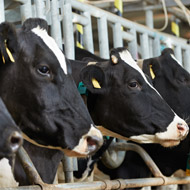New report shows improvements in udder health

The CHAWG report reviews cattle systems, numbers and practices and summarises the performance of welfare measures.
There have been marked improvements in udder health and mastitis reduction in dairy cows, according to the latest report from the Cattle Health and Welfare Group (CHAWG).
Issued bi-annually since 2012, the CHAWG report reviews cattle systems, numbers and practices and summarises the performance of welfare measures, including lameness, mastitis and fertility.
This year’s report shows a clear improvement in udder health since 2010, with a year-on-year decline in clinical incidence. It also illustrates that fewer cows have high somatic cell counts (SCC) and that there are more herds with lower milk bulk tank SCCs.
Chief veterinary officer Christine Middlemiss said that CHAWG’s work with mastitis highlights the importance of good herd health planning in reducing the use of antimicrobials on farm and improving productivity.
‘Industry leaders have driven a proactive approach in grasping the nettle and leading on action, through encouraging best practice and facilitating development of systems for collecting data on antibiotic use,’ she writes in the report's foreword. ‘As the next UK AMR strategy is published, we will continue to work together with CHAWG to ensure all veterinary medicines use in cattle is responsible use – as much as necessary, as little as possible.’
Other stand-out advances raised by the report include those in endemic disease. It reveals that more than 700 vets have now gained ‘Accredited Johne’s Veterinary Advisor status’ and 86 per cent of milk supply is from farms which are part of the National Johne’s Disease Management Programme.
The report also recognises progress in the fight against Bovine Viral Diarrhoea (BVD), noting that 90 per cent of Scottish breeding holdings now have a 'not negative’ status.
CHAWG chair Tim Brigstocke said the evolution of the report over its four editions showed the value everyone derived from shared data. “These reports have real longevity, and I often see them sat permanently on desks for reference, only to be replaced when the next one is published.
“There is no doubt that information has a real opportunity to drive a change in standards. This makes developments coming down the track in form of the Livestock Information Service and the cattle e-Medicines Book tremendously exciting for the step-change in health and welfare performance they offer.”



 The Veterinary Medicines Directorate (VMD) is inviting applications from veterinary students to attend a one-week extramural studies (EMS) placement in July 2026.
The Veterinary Medicines Directorate (VMD) is inviting applications from veterinary students to attend a one-week extramural studies (EMS) placement in July 2026.